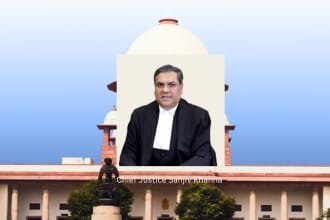The Supreme Court has ruled that disciplinary proceedings against a government employee can be initiated by any superior authority and do not require separate approval from the appointing authority. The Court clarified that Article 311(1) of the Constitution protects employees from dismissal by a subordinate authority but does not mandate that disciplinary proceedings must be initiated by the appointing authority.
A bench comprising Justice Dipankar Datta and Justice Manmohan set aside the Jharkhand High Court’s ruling, which had quashed the dismissal of a government employee on procedural grounds. The Court allowed the State of Jharkhand’s appeal, reinstating the employee’s dismissal.
Case Background: Disciplinary Action Against a State Employee
The respondent was a government employee accused of financial irregularities, forgery, and dishonesty. In 2014, the Deputy Commissioner of Koderma initiated disciplinary proceedings, preparing a draft charge sheet with nine charges, which was approved by the Chief Minister along with proposals for suspension and inquiry officers.
By 2015, the employee was found guilty of six charges, and in 2017, the State Cabinet approved his dismissal after obtaining consent from the State Public Service Commission (appointing authority). The Governor ratified the dismissal.
However, the Jharkhand High Court quashed the dismissal, ruling that the charge sheet was not separately approved by the Chief Minister, thereby violating procedural requirements. The State of Jharkhand appealed to the Supreme Court.
Key Legal Question: Was CM’s Separate Approval for Charge Sheet Required?
The Supreme Court examined whether the High Court was correct in overturning the respondent’s dismissal solely on the ground that the charge sheet had not been separately approved by the Chief Minister.
Supreme Court’s Analysis and Ruling
1. No Legal Requirement for Separate Chief Minister Approval
The Supreme Court overturned the High Court’s decision, clarifying that the Jharkhand Civil Service Rules do not require separate approval of a charge sheet by the Chief Minister. Since the Chief Minister had already approved the draft charge sheet along with the disciplinary proceedings, there was no legal basis to invalidate the dismissal.
“The draft charge-sheet was there on record when the Chief Minister accorded his approval… There appears to be no valid reason as to why this approval should not be regarded as covering the draft charge-sheet as well.”
2. Disciplinary Proceedings Can Be Initiated by Any Superior Authority
Referring to Article 311(1) of the Constitution, the Court emphasized that the only constitutional safeguard is that an employee cannot be dismissed by an authority subordinate to the one that appointed them.
“Article 311(1) does not say that even the disciplinary proceedings must be initiated only by the appointing authority.”
The Court also cited P. V. Srinivasa Sastry v. Comptroller and Auditor General (1993), which held that disciplinary proceedings need not be initiated solely by the appointing authority.
3. High Court’s Judgment Was a Misinterpretation of Law
The Supreme Court criticized the High Court for misapplying legal precedents, stating that the cases of B.V. Gopinath (2014) and State of Tamil Nadu v. Promod Kumar, IAS (2018), which were cited by the High Court, dealt with central service rules and not the Jharkhand Civil Service Rules.
“The Single Judge occasioned a grave miscarriage of justice by interfering with the dismissal on an untenable ground, and the Division Bench contributed to this failure of justice by not correcting the error.”
4. No Procedural Violation in the Dismissal Process
The Supreme Court observed that:
- The disciplinary proceedings were initiated by the Commissioner (a superior authority).
- The State Cabinet approved the dismissal, and the Governor ratified it.
- The absence of a separate approval for the charge sheet by the Chief Minister was not a legal requirement.
Since all procedural requirements were met, the High Court had no grounds to interfere with the dismissal.
Final Decision: Dismissal Upheld, Employee Allowed to Appeal
The Supreme Court restored the dismissal of the respondent but granted him the right to appeal or file a revision within one month on other grounds.
Key Takeaways from the Judgment
- Disciplinary proceedings do not require approval from the appointing authority unless specifically mandated by law.
- Article 311(1) ensures that employees are not dismissed by a subordinate authority but does not require disciplinary proceedings to be initiated by the appointing authority.
- Courts should not interfere with dismissal orders based on technical grounds that are not supported by the applicable rules.


